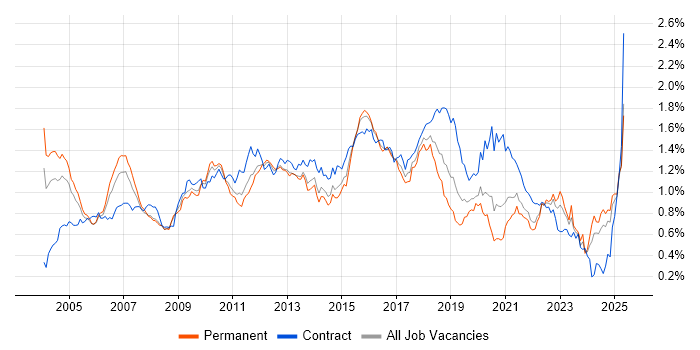Middleware
England > South East
The table below provides summary statistics and salary benchmarking for jobs advertised in the South East requiring Middleware skills. It covers permanent job vacancies from the 6 months leading up to 23 February 2026, with comparisons to the same periods in the previous two years.
| 6 months to 23 Feb 2026 |
Same period 2025 | Same period 2024 | |
|---|---|---|---|
| Rank | 229 | 222 | 306 |
| Rank change year-on-year | -7 | +84 | -22 |
| Permanent jobs citing Middleware | 47 | 54 | 31 |
| As % of all permanent jobs in the South East | 0.41% | 0.68% | 0.25% |
| As % of the Libraries, Frameworks & Software Standards category | 4.57% | 3.05% | 1.25% |
| Number of salaries quoted | 35 | 26 | 20 |
| 10th Percentile | £36,250 | £47,500 | £31,000 |
| 25th Percentile | £43,750 | £49,375 | £40,313 |
| Median annual salary (50th Percentile) | £60,000 | £65,000 | £42,500 |
| Median % change year-on-year | -7.69% | +52.94% | -32.00% |
| 75th Percentile | £85,700 | £67,500 | £53,750 |
| 90th Percentile | £100,000 | £96,250 | £77,000 |
| England median annual salary | £75,000 | £65,000 | £65,000 |
| % change year-on-year | +15.38% | - | -5.13% |
All Software Libraries and Frameworks
South East
Middleware falls under the Software Libraries and Frameworks category. For comparison with the information above, the following table provides summary statistics for all permanent job vacancies requiring technical specification, industry standards, software libraries and framework skills in the South East.
| Permanent vacancies with a requirement for technical specification, industry standards, software libraries and framework skills | 1,028 | 1,768 | 2,473 |
| As % of all permanent jobs advertised in the South East | 8.88% | 22.30% | 19.65% |
| Number of salaries quoted | 830 | 1,033 | 2,027 |
| 10th Percentile | £36,250 | £35,850 | £37,500 |
| 25th Percentile | £47,500 | £47,500 | £46,250 |
| Median annual salary (50th Percentile) | £60,000 | £60,000 | £57,500 |
| Median % change year-on-year | - | +4.35% | -4.17% |
| 75th Percentile | £73,750 | £75,000 | £72,500 |
| 90th Percentile | £90,000 | £83,750 | £85,000 |
| England median annual salary | £65,000 | £67,500 | £62,500 |
| % change year-on-year | -3.70% | +8.00% | -8.78% |
Middleware
Job Vacancy Trend in the South East
Historical trend showing the proportion of permanent IT job postings citing Middleware relative to all permanent IT jobs advertised in the South East.

Middleware
Salary Trend in the South East
Salary distribution trend for jobs in the South East citing Middleware.

Middleware
Salary Histogram in the South East
Salary distribution for jobs citing Middleware in the South East over the 6 months to 23 February 2026.
Middleware
Job Locations in the South East
The table below looks at the demand and provides a guide to the median salaries quoted in IT jobs citing Middleware within the South East region over the 6 months to 23 February 2026. The 'Rank Change' column provides an indication of the change in demand within each location based on the same 6 month period last year.
| Location | Rank Change on Same Period Last Year |
Matching Permanent IT Job Ads |
Median Salary Past 6 Months |
Median Salary % Change on Same Period Last Year |
Live Jobs |
|---|---|---|---|---|---|
| Thames Valley | +18 | 27 | £60,000 | +9.09% | 4 |
| Buckinghamshire | - | 16 | £60,000 | - | 1 |
| Berkshire | -2 | 10 | £37,500 | -31.82% | 2 |
| Hampshire | -2 | 9 | £47,500 | -20.83% | 5 |
| Surrey | -28 | 6 | £100,000 | +53.85% | 1 |
| Isle of Wight | - | 3 | - | - | |
| Oxfordshire | +2 | 1 | £115,000 | - | 1 |
| Kent | - | 1 | £85,700 | - | |
| West Sussex | - | 1 | - | - | |
| Middleware England |
|||||
Middleware
Co-Occurring Skills & Capabilities in the South East by Category
The following tables expand on the one above by listing co-occurrences grouped by category. They cover the same employment type, locality and period, with up to 20 co-occurrences shown in each category:
|
|
||||||||||||||||||||||||||||||||||||||||||||||||||||||||||||||||||||||||||||||||||||||||||||||||||||||||||||
|
|
||||||||||||||||||||||||||||||||||||||||||||||||||||||||||||||||||||||||||||||||||||||||||||||||||||||||||||
|
|
||||||||||||||||||||||||||||||||||||||||||||||||||||||||||||||||||||||||||||||||||||||||||||||||||||||||||||
|
|
||||||||||||||||||||||||||||||||||||||||||||||||||||||||||||||||||||||||||||||||||||||||||||||||||||||||||||
|
|
||||||||||||||||||||||||||||||||||||||||||||||||||||||||||||||||||||||||||||||||||||||||||||||||||||||||||||
|
|
||||||||||||||||||||||||||||||||||||||||||||||||||||||||||||||||||||||||||||||||||||||||||||||||||||||||||||
|
|
||||||||||||||||||||||||||||||||||||||||||||||||||||||||||||||||||||||||||||||||||||||||||||||||||||||||||||
|
|
||||||||||||||||||||||||||||||||||||||||||||||||||||||||||||||||||||||||||||||||||||||||||||||||||||||||||||
|
|
||||||||||||||||||||||||||||||||||||||||||||||||||||||||||||||||||||||||||||||||||||||||||||||||||||||||||||
